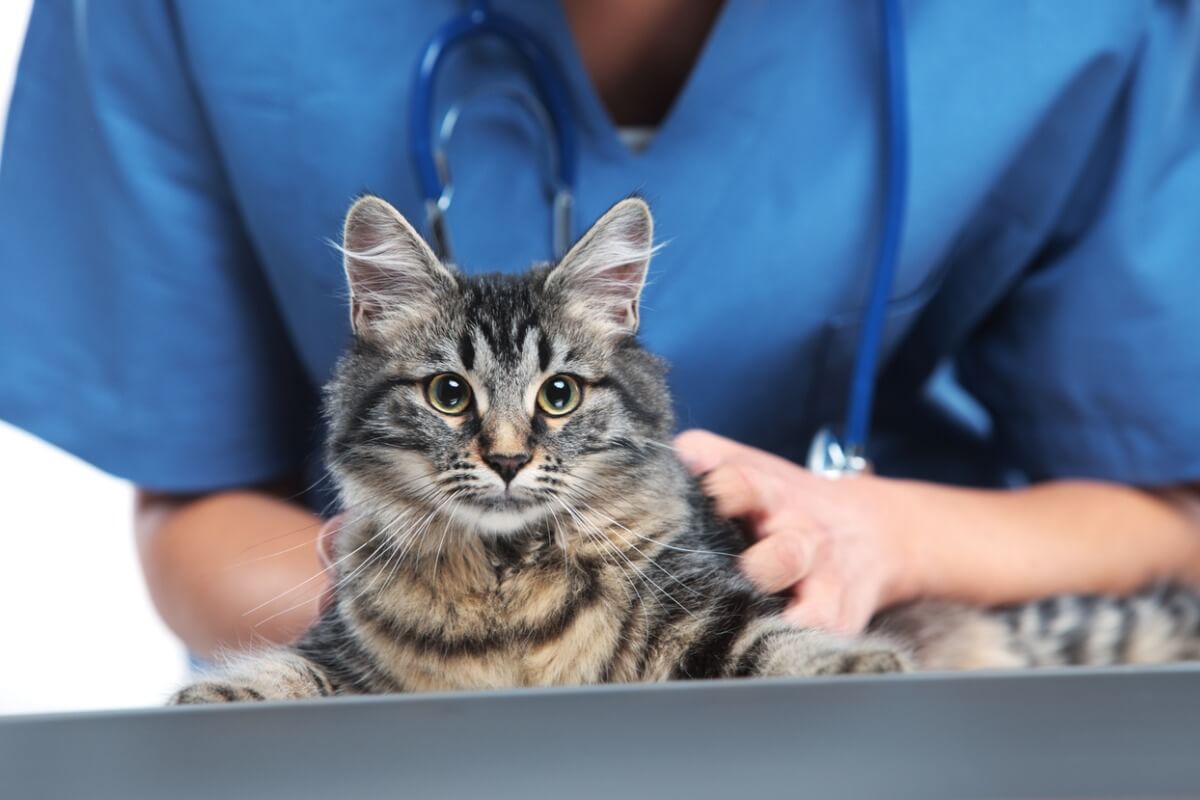Aspirin for Cats? Definitely Not, and Here's Why

Aspirin is a drug frequently used in daily life to reduce pain and inflammation. Although this drug in moderate doses is harmless for humans, aspirin for cats is dangerous and even lethal.
Despite the similarities that exist, the metabolism of domestic felines doesn’t work exactly the same as that of humans. For this reason, certain types of medicines have a different effect on their body, which can be fatal if caution isn’t exercised. Read on to find out why aspirin for cats is not at all recommended.
What is aspirin?
Acetylsalicylic acid, known commercially as aspirin, is a salicin derivative that has anti-inflammatory, analgesic, and antipyretic effects. Its original component (salicin) was first isolated from willow bark, but its chemical manipulation allowed the creation of more efficient drugs.
This drug is very popular in human medicine for its ability to relieve low-intensity pain, such as headaches, myalgia, and arthralgia. It has become a fairly common household analgesic, although there are mild side effects that aren’t often taken into account. Therefore, care should be taken when using it, especially if you are hypersensitive to the compound.

Aspirin mechanism of action
Aspirin is a non-steroidal anti-inflammatory drug (NSAID) that inhibits the enzyme cyclooxygenase (COX). This enzyme is involved in the production of prostaglandins, prostacyclins and thromboxanes, which are essential compounds in the inflammatory process and in the maintenance of blood circulation.
In this reaction, the inhibition of the cyclooxygenase enzyme is irreversible. This means that the levels of the affected compounds, such as prostaglandins, take longer to return to their optimal levels and the effect of the drug is more prolonged.
Although the irreversible nature of the reaction is one of the most useful aspects of aspirin, it’s also the cause of the side effects. According to an article published in the Revista de la Sociedad Española del Dolor the blockage caused by acetylsalicylic acid creates an imbalance in the metabolic pathway, which produces substances that can cause adverse effects.
Of course, the side effects of aspirin are usually mild in humans, as moderate doses aren’t dangerous for us. However, this same metabolic imbalance can be harmful to other species due to physiological differences.
Why is it dangerous to give aspirin to cats?
The main problem with giving aspirin to cats is an overdose. All of the presentations of aspirin that exist are formulated for the weight and size of a human. Therefore, when administering this drug to pets, the dosage must be calculated and the tablet divided. These steps aren’t always accurate, which can cause overdosing problems.
Aspirin side effects in cats
Of course, overdosing isn’t the only problem cats can have when ingesting aspirin; they also face several side effects even if they use the correct dosage. According to a study published in the British Veterinary Journal, acetylsalicylic acid causes internal bleeding and anemia that appear within a week of treatment.
As mentioned, aspirin inhibits the cyclooxygenase enzyme to produce its therapeutic effects. The only problem is that this same enzyme is an essential component of other vital body functions. For example, it’s present in the central nervous system, kidney, vascular endothelium, and gastrointestinal tract.
When the action of cyclooxygenase is inhibited, the metabolic processes of the systems and organs that utilize it are also affected. This causes different complications in feline health, such as:
- Kidney problems
- Internal hemorrhages
- Digestive system problems (diarrhea or bleeding in the intestines)
- Reduction in the efficiency of coagulation
- Lethargy or depression
- Altered urination
- Liver problems (possible hepatotoxicity)
Despite the above, aspirin has been used as an infrequent drug to treat cardiomyopathies in cats. However, the risk involved is so high that other drugs with similar and less dangerous effects, such as meloxicam or clopidogrel, are currently used.
Don’t self-medicate your cat
Your cat shouldn’t consume drugs formulated for humans without the supervision and recommendation of a professional. Keep in mind that their metabolism is different and the drugs may not create the same therapeutic effects.
Although there’s still insufficient scientific evidence, some specialists believe that cats’ bodies may be more susceptible to aspirin. This would explain why they develop clear side effects in such a short time, when in humans they’re usually mild with moderate doses.

In any case, it’s crucial to avoid self-medication and to go to the veterinarian whenever necessary. Only vets are qualified to diagnose and prescribe the right medicine for your pet. Don’t put their health in jeopardy and give them the attention they deserve. Be sure that they will thank you with much affection.
All cited sources were thoroughly reviewed by our team to ensure their quality, reliability, currency, and validity. The bibliography of this article was considered reliable and of academic or scientific accuracy.
- Moreno-Brea, M. R. (2005). Tolerabilidad de aspirina. Revista de la Sociedad Española del Dolor, 12(6), 357-372. https://scielo.isciii.es/scielo.php?script=sci_arttext&pid=S1134-80462005000600006
- Cervera, R. E. J. (2010). Un medicamento ancestral: ácido acetilsalicílico (Aspirina®). Revista Mexicana de Urologia, 70(4), 197-198. https://www.elsevier.es/es-revista-revista-mexicana-urologia-302-articulo-un-medicamento-ancestral-acido-acetilsalicilico-X2007408510559755
- Penny, R. H. C., Carlisle, C. H., Prescott, C. W., & Davidson, H. A. (1967). Effects of aspirin (acetylsalicylic acid) on the haemopoietic system of the cat. British Veterinary Journal, 123(4), 154-161. https://www.sciencedirect.com/science/article/abs/pii/S0007193517400546
- Sparkes, A., Heiene, R., Lascelles, D., Malik, R., Sampietro, L., Robertson, S., Scherk, M. & Taylor, P. (2010). Uso a largo plazo de AINEs en gatos. Journal of Feline Medicine and Surgery, 12, 521-538. https://catvets.com/public/PDFs/PracticeGuidelines/Translated/NSAIDS-guidelines(Spanish).pdf
- Hogan, D. F., Fox, P. R., Jacob, K., Keene, B., Laste, N. J., Rosenthal, S., … & Weng, H. Y. (2015). Secondary prevention of cardiogenic arterial thromboembolism in the cat: the double-blind, randomized, positive-controlled feline arterial thromboembolism; clopidogrel vs. aspirin trial (FAT CAT). Journal of Veterinary Cardiology, 17, S306-S317. https://www.sciencedirect.com/science/article/abs/pii/S1760273415000958
This text is provided for informational purposes only and does not replace consultation with a professional. If in doubt, consult your specialist.